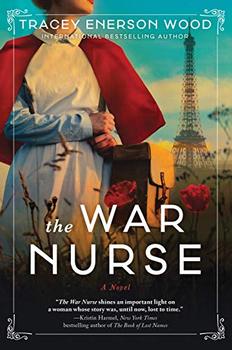How much did you know about nursing (particularly World War I–era nursing) before reading this book? What was the most surprising thing you learned?

 How much did you know about nursing (...
How much did you know about nursing (...
Created: 07/08/21
Replies: 18
Join Date: 10/15/10
Posts: 3442
Join Date: 02/08/16
Posts: 514
Join Date: 11/14/11
Posts: 160
I had a rudimentary knowledge of nursing from the American Civil War, Crimea, WWI and beyond. Consider that Florence Nightingale during Crimea first introduced the concept of sanitation in 1854! Before that and even after, more soldiers died from sepsis and infection than battle wounds. Fleming did not ‘discover’ antibiotics until 1928! Until then a prick from a rose thorn could cause death. The beauty of WWI nursing...the people saved before the advent of penicillin. Wow!
Join Date: 06/13/11
Posts: 28
Join Date: 10/19/20
Posts: 237
I knew very little, those who were nurses already and joined had a hospital training certificate but not equivalent of a college degree. However, the nurses did discover techniques and devices, and made recommendations that enhanced sanitation, medical procedures and policies, and patient care.
Join Date: 01/01/16
Posts: 444
All I knew was from other novels and movies, which was not a lot. I was surprised that some of them actually had to go closer to the battle field. Also the size of their facilities and how many soldiers they were able to take care of. All very dedicated nurses.
Join Date: 08/14/13
Posts: 50
I knew nothing of nursing, but the book gave a fascinating snapshot of nursing during a period of critical development during a crisis. As they encountered and developed rudimentary quarantine standards for the flu, I found interesting parallels to our response to Covid-19. The compassion, hard work and empathy displayed by the characters of the story are admirable.
Join Date: 06/19/12
Posts: 408
I'd read a bit about nursing practice in that era - several books about the Spanish flu epidemic and Band of Sisters by Lauren Willig, a recent piece of historical fiction which examines a a very similar situation. This book deals more directly with nursing practice and emphasizes the procedural limitations placed on nurses. Being more familiar with the procedures nurses are allowed to perform today, I was surprised at how limited they were then.
Join Date: 01/27/18
Posts: 98
Join Date: 05/25/21
Posts: 30
Join Date: 02/29/16
Posts: 189
Join Date: 09/06/16
Posts: 30
Nursing is a familiar field for me as my Mom was a nurse, my daughter is a Nurse Practitioner and my son in law is a nurse. Also, I worked as a surgical coordinator for over 10 years. However, until I read this book, I did not know much about WWI nursing. I was surprised when Julia had people use face masks to help control the influenza spread. It reminded me so much of how we had to resort to homemade masks during the recent pandemic.
Join Date: 07/13/21
Posts: 1
I really knew very little, but what I did learn in this book made me proud to be a nurse! I was very curious the historical accuracy of the book so I did a little digging afterwards and besides embellishing relationships it seems very accurate.
I was surprised that the doctors allowed the nurses so much autonomy during this time! I understood this to come much later to the field of nursing, but I suppose it was wartime and things were different.
Join Date: 09/14/11
Posts: 94
Join Date: 01/23/15
Posts: 225
Join Date: 05/17/12
Posts: 94
I must admit I did not know a lot about nursing in WWI. Have read about nursing in WWII (We Band of Angels by Elizabeth Norman) and Viet Nam (Women at War also by Elizabeth Norman, Home Before Morning by Lynda Van Devanter). Have colleagues who were nurses in the military in Viet Nam. They have shared the horrors of war, the emotional impact and the aftermath for them. Have read several great novels about nursing in Viet Nam as mentioned above. Have a special place in my heart for military nurses. I expected the novel to give me more of the same, the emotional component, fears and feelings associated with war nursing. Initially I was disappointed in the novel for its lack of descriptions of battlefield nursing, the emotional and physical. I also realize this is about one particular person and her experiences and contributions....to nursing and society.
Join Date: 06/25/13
Posts: 347
What I know of nursing is what I have read and what nursing friends have told me. I also did read Band of Sisters. This was placed during WWII and the nurses seemed to have gained more power. I was surprised that they did not have more training in combat injuries before they were sent to France. They had no idea what they were getting into. I think this was wrong.
Join Date: 03/29/16
Posts: 364
I have read a few books on WWI and nursing in WWI. I think I was most surprised in this book to hear of the competition between the Drs and the nurses instead of working together and teaching each other new methods and practices, especially while in theater. There was less of a family attitude than I expected.
Join Date: 03/10/15
Posts: 47
This book delved into an area of wartime nursing that was new and interesting to me. Julia Stimsom was a gifted administrator . She was a brilliant women who created nursing protocol as the situation arose. Julia was a pioneer in nursing and as such, she had to fight misogeny, ignorance, stereotypes, terrible misunderstandings and disappointment. However, she seems to have possessed empathy , kindness, understanding, loyalty and wisdom. She is a historical figure whom I would have loved to interview.
Reply
Please login to post a response.